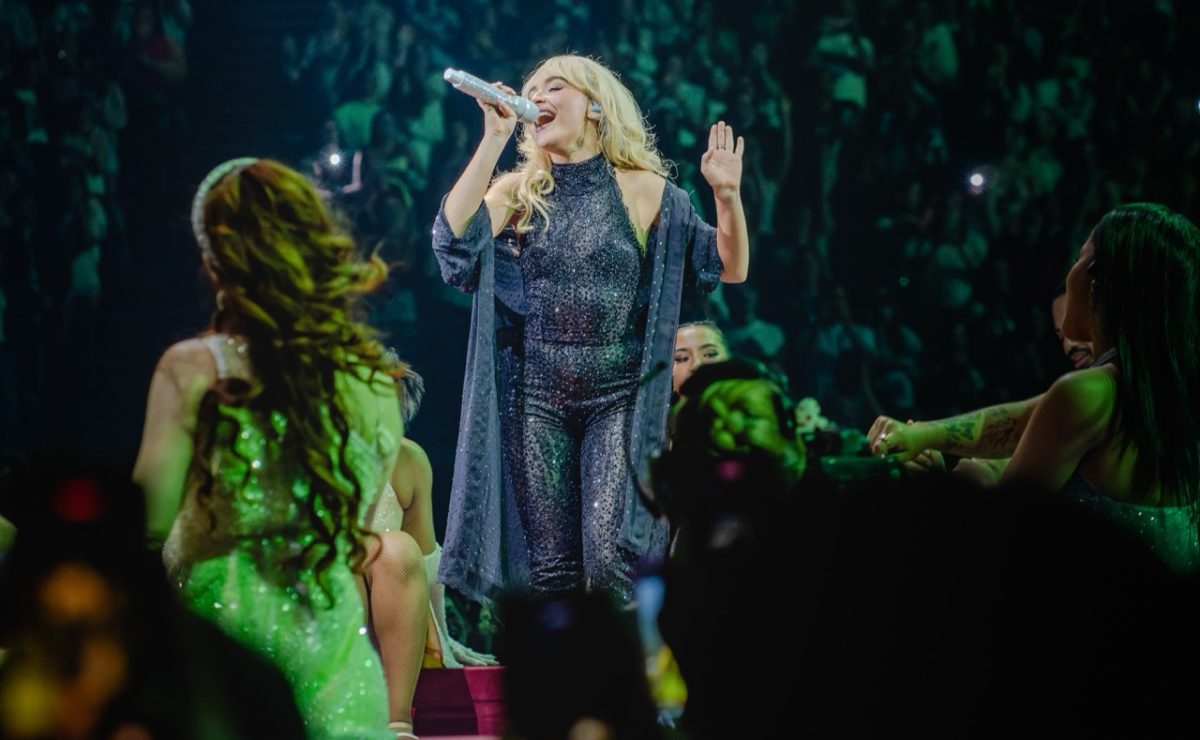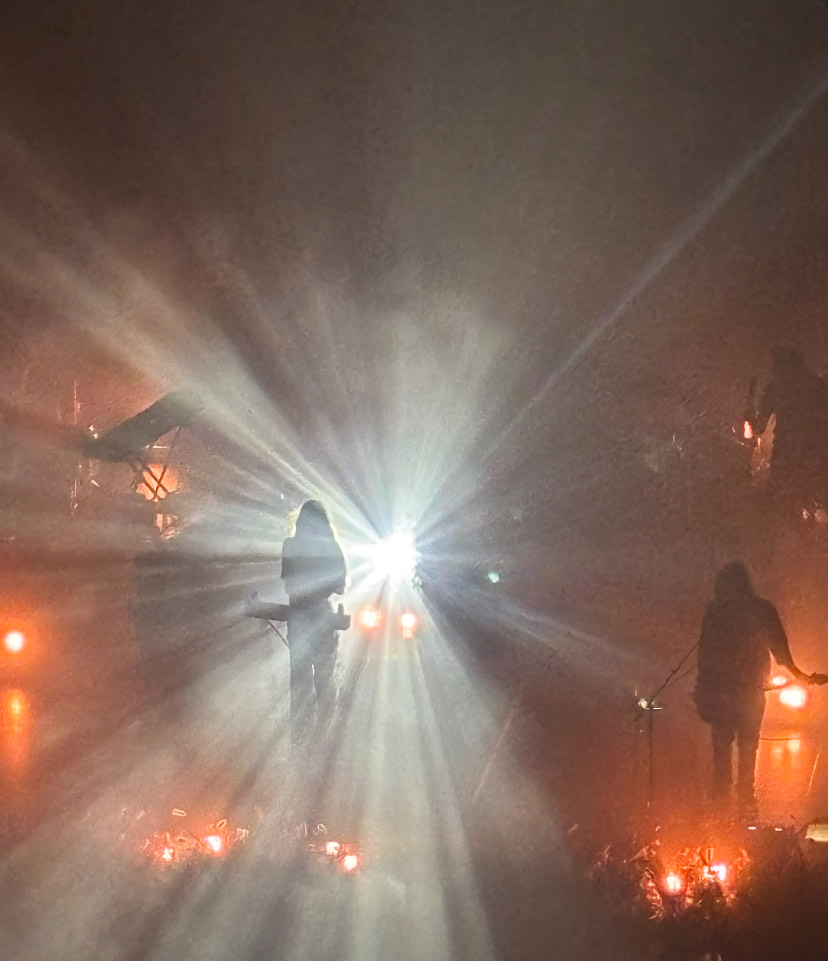The last place we expected to find ourselves on a Friday evening was the Arab Film Festival — located in a quaint, lively cinema alongside the Mississippi River. The Main Cinema held its own quirky sophistication. From the clumps of 30-year-old women manning champagne glasses outside, to the neighborhood locals on their nightly strolls, we felt both strangely comforted and enthralled by the scenery laid out before us.
Even though the event was sanctioned by the Macalester French Department, none of us had taken French before. We were looped into attending this festival by our friend, though we each had our unique motivations for agreeing. One of us simply lunges at an opportunity to watch a film, another grew up speaking French, and then the other kind of just got strung along.
We had no expectations going into this — none of us even looked up what “Aïcha,” the film we were about to see, was about. All we knew was the title and that it probably had something to do with the French language. In retrospect, our naivety was the genesis of a whirlwind of existential thought.
“Aïcha” is centered around the protagonist Aya, a young Tunisian woman, who, despite being hardened by the circumstances of her life in Touzeur, remains resilient throughout her journey. For Aya, surviving means growing up fast. Since she was fourteen, classrooms had been traded for cleaning shifts at cheap hotels to keep her family afloat. By her late twenties, Aya is completely trapped: underpaid, overworked, and under familial pressure.
Then, a fatal car accident changes everything. She fakes her death and runs, stealing just enough money from her manipulative boss to start over in Tunis. There, she becomes Amira. Her new life starts as a bold act of freedom, but a false accusation spirals into violence while a cover-up drags her into governmental corruption. When everything unravels, she sheds her name once again — this time as Aïcha. Another new name, another new city, but the same fight to survive.
The first motif of the film that stood out to us was Aya’s relationship dynamics. At the start, her mother is incessant, pushing her to marry up in response to Aya’s deteriorating work life, while her father remains in the background, silent, revealing his distance. Contrastingly, in Tunis, Aya helps remedy an argument between a woman and her abusive ex-husband; a gesture which leads her to obtain a job and a place to stay when things inevitably get totaled with her psychotic roommate. This seemingly insignificant encounter with the woman bloomed into a heartwarming relationship. In fact, it’s the only relationship we root for as the audience.
Eventually, her parents track her down in Tunis, but it’s frustrating to see how even as years have passed, the confrontation plays out the same as it did in her childhood: her mother rambles on, her father watching in silence. It’s only later, when her father walks into the diner where she works, that we hear his voice for the first time. He mumbles just a couple of words and then, together, they step outside. Their voices cut off, leaving us in utter bewilderment as a musical score drowns out any leftover noise. This directorial choice revealed to us how silence doesn’t equal absence. In “Aïcha”, silence carries its own weight, sometimes saying more than words ever could.
As the film progressed, from how Aya is treated by her parents, the men in her life, and law enforcement, we could sense the filmmakers pushing for Aya to serve as the poster girl representation for a woman’s harsh reality in society. Though upon post-film reflection, we recognized this film partially fell into the trap of trauma exploitation, where pitfall after pitfall somehow occurs in Aya’s life. Although there’s no doubt these events can truthfully happen on their own, the line between authentic representation and exploitation becomes blurred when these events are forcefully strung together. Moreover, we were confused whether or not we were meant to feel pity, empowered, or possibly both by Aya’s circumstances and behavior as a woman.
Undeniably, some scenes left us and the audience in a reverberating silence. In one, Aya watches in plain sight as people carry out her empty casket, and in the second, after once again shedding her old identity, she watches from the back of the courthouse as this old identity is prosecuted. Though in both, she’s dressed in a niqab, providing her secrecy — she’s exposed but also completely hidden. The juxtaposition of standing there, obvious and evident, but also vanishing in the eyes of others, was clever and applicable to a woman’s truth.
The film felt mildly self-aware — it’s clear the filmmakers didn’t want to draw out cliched “female empowerment” sentiment in Aya’s disturbing reality — but simultaneously they refuse to ground her character in something other than trauma. Ultimately, her character felt raw yet hollow. We now know what the filmmakers want Aya to represent in the grand scheme of society. But at the film’s core, who is Aya herself?
The last theme we wanted to explore was how law enforcement is intertwined with corruption. As we near the climax of the film, a man named Karim hits on Aya at the club. Aya, taken aback, rejects him. At this moment, Rafik, a male friend of Aya, violently confronts Karim, escalating the situation as security guards begin dragging Karim away.
Later that night, Karim is declared dead. This event ends up turning into a web of lies, cover-ups, and manipulation, where Aya ends up lying to conceal Rafik’s actions.
The way this conflict plays out explores a breakaway from corruption. This oppression is based on the ignorance of the general population and the compliance of systems in power. However, both the police chief and Aya fight back against the system by releasing the tape of Karim’s murder. We noted how this illustrates how revealing the truth forfeits corruption, and therefore, corruption is merely just a pawn for manipulation. One always has the power to be their desired change, just like the police chief helps Aya and reveals the truth of Karim’s death.
In the grand scheme of the film, some of us walked out feeling revolutionized, while others felt conflicted on how to feel. The apparition of expressions flooding out the cinema doors mirrored our own — hopeful or hopeless? The nuance of our feelings confirmed one thing to be true: the point of the film is not necessarily to garner one emotion from its audience. Rather, “Aïcha” is a tool, one that serves as a foundation for further conversation — a bridge for us to process our pre-existing thoughts and to ground them.












